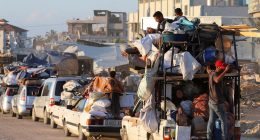During his second term as Brazilian president in 2010, Luiz Inácio Lula da Silva visited Jerusalem’s Holocaust museum with his Israeli counterpart Shimon Peres and said all world leaders should travel there to understand what happens “when irrationality takes over”.
Thirteen years later, Israel’s foreign minister chose the same spot to declare Lula, now serving his third term, persona non grata in the Jewish state until he retracted impromptu remarks comparing the death toll in the air and land offensive in Gaza to the Holocaust.
Following Israel Katz’s extraordinary step, Brazil rejected the Israeli minister’s remarks as “revolting” and accused him of lying about Lula’s comments, which had been made at an African summit.
The diplomatic row overshadowed a G20 foreign ministers’ meeting chaired by Brazil in Rio de Janeiro this week — with US secretary of state Antony Blinken saying he had a “frank exchange” with Lula on the matter.
“The Brazil-Israel spat is not merely a hiccup but a reflection of Israel’s growing difficulties in making its case across the global south,” said Oliver Stuenkel, associate professor of international relations at the Fundação Getúlio Vargas in São Paulo. “The global north and the global south diverge quite a bit on this conflict.”

Many nations with a history of colonial occupation have historically supported Palestinian aspirations to independent statehood. But the west’s relatively muted response to the rapidly mounting death toll in Gaza — in contrast to its immediate and repeated denunciation of Russian killing in Ukraine — exposed what some developing nations see as hypocrisy and double standards.
In opening remarks to the G20, Brazil’s foreign minister Mauro Vieira contrasted the nations of the North, tied by the Nato military alliance, with those of the south, which were “covered by various layers and zones of peace and co-operation”.
As the Gaza death toll mounted, Brazil’s Brics ally South Africa opened a case against Israel at the International Court of Justice last month alleging genocide against the Palestinian people, a charge the Jewish state strongly rejected.
“Some have told us to mind our own business. Others have said it was not our place,” President Cyril Ramaphosa said after the ICJ handed an interim order to Israel to prevent its military from committing acts, which might be considered genocidal and to enable humanitarian assistance to Gaza.
“And yet it is very much our place, as people who know too well the pain of dispossession, discrimination and state-sponsored violence. We, as South Africans, will not be passive bystanders and watch the crimes that were visited upon us being perpetrated elsewhere,” Ramaphosa added.

At the African Union summit in Addis Ababa where Lula spoke last weekend, leaders lined up to condemn Israel’s offensive against Hamas in Gaza, which Palestinian authorities say has killed more than 29,000 people. Hamas’s attacks on Israel on October 7, which prompted the war in Gaza, killed 1,200 people and 250 were taken hostage.
Moussa Faki, chair of the African Union Commission, said Israel’s offensive was the “most flagrant” violation of international law and accused Israel of wanting to “exterminate” Gaza’s inhabitants. Azali Assoumani, outgoing chair of the African Union, condemned “the genocide Israel is committing in Palestine under our nose”.
Not all African nations have criticised Israel. Kenya, Ghana, Malawi and the Democratic Republic of Congo have voiced support, but they are in the minority.
Israel retains some other allies in the developing world, notably India’s nationalist Prime Minister Narendra Modi and Argentina’s libertarian president Javier Milei.
But experts say the heavy death toll in Gaza has triggered an unprecedented hardening of attitudes against the Jewish state in the developing world.

“What has been unfolding in Gaza and [Israeli prime minister Benjamin] Netanyahu’s intransigence has generated a pretty united picture in Latin America that goes beyond left and right politics,” said Michael Shifter, former president of the Inter-American Dialogue, a Washington think-tank. “It’s deeper than that.”
The presidents of Colombia and Bolivia rushed to support Lula, while Mexico and Chile have asked the Hague-based International Criminal Court to investigate Israel for possible crimes against civilians in Gaza, even though Israel does not recognise the court’s authority.
Claudio Epelman, executive director of the Latin American Jewish Congress, raised the concern that the Brazilian government’s “aggressive” position on the war in Gaza had provided cover for politicians close to Lula to take anti-Jewish positions.
Jose Genoíno, a former president of Lula’s party, alarmed Brazil’s 150,000-strong Jewish community when he called last month for a boycott of Jewish-owned businesses “to hurt economic interests”. Far from condemning his remarks, two of Lula’s cabinet ministers supported him.
Modi’s government in India has cultivated close ties with Israel since taking power in 2014 and has refrained from condemning the Gaza offensive. But it has lamented the loss of life, sent humanitarian aid to Gaza and reiterated India’s support for the creation of a sovereign Palestinian state.
Unions and a swath of Indian civil society, however, have voiced opposition. A union representing port workers last week said it would refuse to load or unload weapons to Israel “in solidarity with a call by Palestinian trade unions”.
The ICJ case, meanwhile, burnishes South Africa’s portrayal of itself as an alternative to a world order it sees as based on western hegemony. Ramaphosa led vocal denunciations of western vaccine nationalism during the pandemic, and has cast the recent expansion of the Brics grouping as a bulwark against western economic interests.
“They saw an opportunity to test the [international] system, and that’s precisely what they’ve done,” said Piers Pigou, Southern Africa programme head at the Institute of Security Studies.
FGV’s Stuenkel noted that the divergence between the west and the developing world over Gaza is mirrored in Ukraine; in both conflicts, many emerging powers have repudiated war and called for negotiations to find a peaceful solution.
“When you look at the two most visible global conflicts at this point — Ukraine-Russia and Israel-Hamas — on both, there’s quite a division between the global north and the global south,” he said.
Also Read More: World News | Entertainment News | Celebrity News








